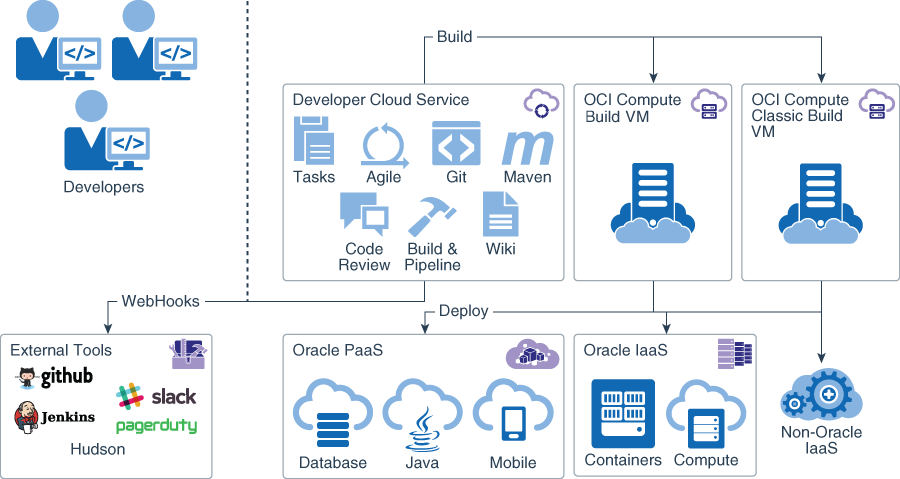What is Oracle Developer Cloud Service?
Oracle Developer Cloud Service (DevCS) is a cloud-based software development Platform as a Service (PaaS) and a hosted environment for your application development infrastructure. It provides an open source standards-based solution to plan, develop, collaborate, build, and deploy applications in Oracle Cloud.
DevCS can make your software development experience easier by providing:
- Git repositories, so you can host your application source code files on Oracle Cloud and track their versions
- Maven repositories, so you can host library and binary dependencies of your Maven applications
- Build system, so you can automate builds with continuous integration and continuous testing using Oracle Cloud Infrastructure Compute or Oracle Cloud Infrastructure Compute Classic Virtual Machines
- Deploy system, so you can automate deployment to Oracle Java Cloud Service, Oracle Application Container Cloud Service, and Oracle Java Cloud Service - SaaS Extension
- Code review, so you can peer review the code updates
- Issue tracking system, so you can track tasks, defects, and features
- Wikis, so you can collaborate with your team
- Integration with Eclipse IDE, Oracle JDeveloper, and NetBeans IDE, so you can access and update source code files from your favorite IDEs
- Integration with external software using webhooks, so you can send DevCS event notifications to the external software
As soon as your DevCS account is active, you can access its features immediately.
This diagram shows a basic workflow in DevCS.
The diagram shows how a team of developers work together and use DevCS to write code, track issues, build, and deploy applications.
- The team updates code in the hosted Git source code management repositories and uploads dependencies to the hosted Maven repository.
- As the software development progresses, the team reviews the code updates using the built-in code review system.
- Using the built-in issue tracking system, the team tracks tasks and defects and then, using Agile boards, they track their development progress.
- To run builds and tests of the software application, the team sets up build jobs and pipelines that run builds on Oracle Cloud Infrastructure Compute or Oracle Cloud Infrastructure Compute Classic Virtual Machines.
- The team deploys the built artifacts to Oracle PaaS, Oracle IaaS, or on-premise non-Oracle IaaS instances.
- Using webhooks, the team sends out DevCS event notifications to external tools and software, such as Slack and Jenkins.
Watch a short video to learn more about DevCS.
A Word About Oracle Cloud Infrastructure
If you're an Oracle Cloud Infrastructure (OCI) user, you can create a Developer instance. If you're an Oracle Cloud Infrastructure Classic (OCI Classic) user, you can create a Developer Classic instance. These instances have no functional differences.
On OCI, DevCS builds run on Oracle Cloud Infrastructure Compute (OCI Compute) virtual machines (VMs). Project artifacts are stored in an Oracle Cloud Infrastructure Object Storage (OCI Object Storage) bucket.
On OCI Classic, DevCS builds run on Oracle Cloud Infrastructure Compute Classic (OCI Compute Classic) virtual machines (VMs). Project artifacts are stored in an Oracle Cloud Infrastructure Object Storage Classic (OCI Object Storage Classic) container.
Before you can use DevCS on OCI or OCI Classic, you must configure a connection to Compute and Object Storage instances. See Connect to OCI or OCI Classic.
What is a Project?
A project is a collection of DevCS features.
You can use a project to host source code files, track issues, collaborate on code, build, and deploy your applications. A project can host multiple Git repositories. Each Git repository can have multiple branches and hundreds of code files. You can create a merge request for each branch of the Git repository and ask reviewers to review the code. You can create and configure multiple build jobs to generate different project artifacts that you can deploy to Oracle Cloud or your on-premise web server.
Watch a short video to learn more about DevCS projects.
Project Visibility
A project can be a private project or a shared project. There are no public projects. You can define a project’s visibility when you create it, or from its properties page later.
Private projects are accessible to invited users only. Shared projects are accessible to all users of the organization. Any user can view the source code, create or update issues, edit wiki pages, and interact with project builds. However, only invited users can make updates to the source code in Git repositories, create and run build jobs, and perform deployment operations.
